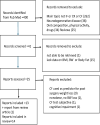Does Energy Restriction and Loss of Body Fat Account for the Effect of Intermittent Fasting on Cognitive Function?
- PMID: 40805992
- PMCID: PMC12348356
- DOI: 10.3390/nu17152407
Does Energy Restriction and Loss of Body Fat Account for the Effect of Intermittent Fasting on Cognitive Function?
Abstract
Intermittent fasting (IF) and caloric restriction (CR) have garnered attention for their potential to enhance cognitive function, particularly in aging and metabolically compromised populations. This narrative review critically examines whether the cognitive benefits of IF are attributable to its specific fasting patterns or are instead mediated by the production of weight loss, fat loss, and improvements in insulin sensitivity. Evidence from human trials suggests that reductions in body weight, especially visceral adiposity, and improvements in insulin resistance are key factors linked to enhanced cognitive performance. Comparisons between the results of IF and CR trials show comparable cognitive outcomes, supporting the idea that negative energy balance, rather than fasting or altered eating patterns, drive these effects. However, further investigation of specific types of IF patterns, as well as possible cognitive domains to be affected, may identify mechanisms through which IF can yield benefits on neurocognitive health beyond those of loss of body fat and its accompanying inflammatory state.
Keywords: Inflammation; Time-Restricted eating (TRE); body fat; brain health; caloric restriction (CR); cognitive function; insulin resistance; intermittent fasting (IF); visceral adiposity; weight loss.
Conflict of interest statement
The authors declare no conflicts of interest.
Similar articles
-
Effects of Intermittent Fasting and Calorie Restriction on Exercise Performance: A Systematic Review and Meta-Analysis.Nutrients. 2025 Jun 13;17(12):1992. doi: 10.3390/nu17121992. Nutrients. 2025. PMID: 40573103 Free PMC article. Review.
-
Prescription of Controlled Substances: Benefits and Risks.2025 Jul 6. In: StatPearls [Internet]. Treasure Island (FL): StatPearls Publishing; 2025 Jan–. 2025 Jul 6. In: StatPearls [Internet]. Treasure Island (FL): StatPearls Publishing; 2025 Jan–. PMID: 30726003 Free Books & Documents.
-
Intermittent fasting strategies and their effects on body weight and other cardiometabolic risk factors: systematic review and network meta-analysis of randomised clinical trials.BMJ. 2025 Jun 18;389:e082007. doi: 10.1136/bmj-2024-082007. BMJ. 2025. PMID: 40533200 Free PMC article.
-
Effect of Calorie Restriction and Intermittent Fasting Regimens on Brain-Derived Neurotrophic Factor Levels and Cognitive Function in Humans: A Systematic Review.Medicina (Kaunas). 2024 Jan 22;60(1):191. doi: 10.3390/medicina60010191. Medicina (Kaunas). 2024. PMID: 38276070 Free PMC article.
-
The impact of intermittent fasting on body composition and cardiometabolic outcomes in overweight and obese adults: a systematic review and meta-analysis of randomized controlled trials.Nutr J. 2025 Jul 30;24(1):120. doi: 10.1186/s12937-025-01178-6. Nutr J. 2025. PMID: 40731344 Free PMC article. Review.
References
-
- Alsuwaidi H.N., Ahmed A.I., Alkorbi H.A., Ali S.M., Altarawneh L.N., Uddin S.I., Roueentan S.R., Alhitmi A.A., Djouhri L., Chivese T. Association between Metabolic Syndrome and Decline in Cognitive Function: A Cross-Sectional Study. DMSO. 2023;16:849–859. doi: 10.2147/DMSO.S393282. - DOI - PMC - PubMed
Publication types
MeSH terms
LinkOut - more resources
Full Text Sources
Miscellaneous


